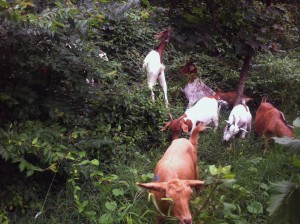25
May
Goats Put to Work to Restore NYC’s Prospect Park
(Beyond Pesticides, May 25, 2016) New York City’s Prospect Park is bringing in a herd of goats to fight back opportunistic species that are encroaching in an area of the park after damage caused by Hurricane Sandy. Rather than spray toxic weed killers like 2,4-D, triclopyr, or glyphosate, the Prospect Park Alliance used the grant money it obtained from the National Park Service to bring in these 4-legged weed warriors as a safe and environmentally friendly way to restore storm-damaged areas. 
“We are pleased to welcome these goats to Prospect Park to help us further the important woodland restoration work that has always been a focus for the Alliance,” Prospect Park Alliance President Sue Donoghue said to ABC7. “These goats will provide an environmentally-friendly approach to our larger efforts, which will not only beautify the Park, but make it more resilient to future storms.”
After Hurricane Sandy barreled up the east coast, a roughly 1.5 acre area of Prospect Park was seriously damaged, with 100s of trees toppled. The disturbance has allowed so-called invasive species to move into the park, supplanting the regrowth of native species in the last remaining forested area in the borough of Brooklyn. Goats act as broad-spectrum weed killers; they will eat everything. In fact, goats are often more efficient at eradicating weeds, and are more environmentally sustainable than using harmful pesticides and chemicals. Once goats graze a weed it cannot go to seed because it has no flower and cannot photosynthesize to take in sunlight and build a root system because it has no leaves. Grasses are a last choice for goats, which means desirable grass species are left behind with natural fertilizer to repopulate the land. Goats are notorious for eating poisonous plants, such as poison ivy and poison oak, and can handle them without getting sick.
Prospect Park joins the long and growing list of places that have opted for goat-powered weed control over the use of toxic pesticides. The list ranges from D.C’s Congressional Cemetery, to Google’s Corporate Campus, Chicago O’Hare International Airport, and cities from Durango, CO, to Carrboro, NC, and Cheyenne, WY. In California, they have been used to prevent wildfires during the drought. Recent studies show their value in suppressing opportunistic weeds like phragmities.
Goats are perfect for areas where even mechanical controls are difficult to use. “This area’s steep hillsides present unique challenges and access issues for staff and machinery, but are easily accessible to goats-providing an environmentally friendly and highly efficient approach to weed removal,” said Christian Zimmerman, Prospect Park Alliance Vice President of Capital and Landscape Management to ABC7. “Once their work is complete, we will then plant new native trees and shrubs, including red and white oaks, spicebush and service berry, which will help bring back important habitat for birds and other wildlife.” Goats also provide a great attraction for kids and parents alike, who can watch the ruminant animals hard at work.
Beyond Pesticides has long been an advocate for the use of goats and grazing animals as a least-toxic, biological solution for weed management. To learn more, read “Successfully Controlling Noxious Weeds with Goats: The natural choice that manages weeds and builds soil health.” Watch Beyond Pesticides’ Board Member Lani Malmberg, a professional goat herder and owner of Ewe4ic Ecological Services, speak at the 33rd National Pesticide Conference along with other experts on the Organic Land Management and Cutting Edge Alternatives panel. For more information on natural, non-chemical land management strategies see Beyond Pesticides’ Lawns and Landscapes and Invasive Weed Management pages.
All unattributed positions and opinions in this piece are those of Beyond Pesticides.










